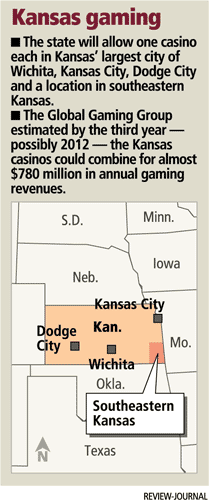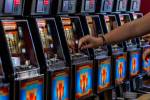A revenue source in plains sight
Gaming analysts believe four proposed casinos in Kansas could provide operators with a steady flow of gaming revenue although the potential figures won't be a trip down the Yellow Brick Road.
Kansas lawmakers, tired of seeing residents flock across the border to wager away potential tax dollars at casinos in Kansas City, Mo., or at American Indian-run gambling halls in Oklahoma, decided to make their state the newest gaming battleground.
The recently enacted legislation designated four state-owned casino sites, but also included a tax rate of 27 percent and set certain parameters for entry, such as a minimum investment of $225 million for each of the facilities.
Because the casinos are full-fledged gaming halls with both slot machines and table games, observers believe some of the top-tier gaming companies will have an interest in Kansas.
Pennsylvania, the most recent state to legalize gaming of any consequence since the late 1990s, allowed just 65,000 slot machines and prohibited table games at its five casinos and seven racinos. Florida, which expanded its gaming rules to add slot machines, also put in several limitations.
"For gaming companies looking to expand domestically, Kansas is attractive because there clearly haven't been many new states to enact gaming opportunities," said Jacob Oberman, senior analyst with CB Richard Ellis' Global Gaming Group, which authored a recent study of the Kansas casino market.
"Assuming they don't raise the tax rate, this could be a market where operators could find some potential opportunity to achieve a nice return on their investment," Oberman said.
The state will allow one casino each in Wichita, Kansas City, Dodge City and a location in southeastern Kansas.
Prudential Equity Group gaming analyst Joel Simkins said he didn't think Kansas' relatively small population of more than 2.7 million residents would be a drawback.
"The economy is healthy and we think the state could be an incremental growth opportunity for several casino operators as well as (slot machine) suppliers," Simkins said.
Analysts thought regional casino operators, such as Las Vegas-based Pinnacle Entertainment and Ameristar Casinos, as well expanding Penn National Gaming of Wyomissing, Pa., are expected to look hard at opportunities to move into Kansas. Casino giants, such as MGM Mirage and Harrah's Entertainment, will most likely pass.
"Kansas is a compelling opportunity for savvy operators who can understand and work within the unique characteristics of this gaming market," said CB Richard Ellis Executive Vice President Carlton Geer, who is a partner in the Global Gaming Group.
In its report, the Global Gaming Group estimated by the third year -- possibly 2012 -- the Kansas casinos could combine for almost $780 million in annual gaming revenues, a return on investment of between 15 percent and 21.5 percent.
"Our projections have some upside," Geer said. "We really don't know yet how big the projects will be."
Kansas lawmakers enacted the legislation to open new tax streams and provide job growth. Also, Kansas officials believe the casinos will also attract tourists.
There are still several obstacles to overcome, however, before the Sunflower State begins to challenge its neighbors for casino customers.
Local gaming authorization referendums need to be approved by citizens in the four designated counties. Meanwhile, on the day she signed the casino legislation, Gov. Kathleen Sebelius asked the state's attorney general to seek a ruling from the Kansas Supreme Court to determine if the gaming law is constitutional.
Gaming analysts also expect Kansas' four American Indian-run casinos, which have a combined 2,700 slot machines, to challenge the gaming law in court as it would effect the tribe's decade-long monopoly.
But in preparation for expected bidding, executives from regional casino operators are starting to familiarize themselves with Kansas, hoping the market could expand their casino universe.
"Kansas does have an interest for us and we think it fits quite well with our philosophy of creating a national presence," Pinnacle Entertainment Wade Hundley said.
The company already operates casinos in neighboring markets, including Missouri, Louisiana and Indiana.
Hundley said the Kansas tax rate of 27 percent on total gaming revenues isn't a deterrent. The rate is similar to most of the company's existing markets.
"We will work through the economics and explore all the ramifications but we think Kansas might turn out to be a good market for us," Hundley said. "There aren't many of these opportunities out there nationally right now and from a regional perspective, it wouldn't be a market where we would cannibalize our existing casinos for customers."
A spokeswoman for Ameristar Casinos wouldn't comment specifically on Kansas. However, the company has announced it is in an expansion mode -- it recently bought an Indiana riverboat casino -- and Kansas might fit into the casino operator's plans, analysts say.
However, Ameristar may also look at Kansas to protect its interests in Kansas City, Mo. Ameristar's casino there was the company's second-largest revenue producer in 2006 with $257 million.
Kansas is a potential revenue source that had not figured in the projections of many slot machine suppliers and gaming equipment manufacturers.
Although Kansas is not expected to have potential of the 65,000 slot machines in Pennsylvania, the state could have upward of 11,000 new machines once the casinos come to fruition.
"If the activity in Kansas turns out to be what has been discussed, the this could be a good thing for all the suppliers," Bally Technologies spokesman Marcus Prater said. "We know from past experiences that these types of opportunities take time to develop, but Kansas is definitely a big deal."
A CHALLENGE TO OTHER STATES Kansas lawmakers viewed the gaming revenues and subsequent tax dollars produced by casinos in nearby states as one reason for legalizing gambling. Gaming analysts project casinos in Kansas could equal Colorado's $782.1 million in gaming revenue reported in 2006. Also, the casinos are expected to cut into neighboring Missouri's total gaming win, $1.6 billion in 2006. Missouri's revenues are boosted by gaming win at properties across the Missouri River from Kansas in populous Kansas City, including casinos run by Ameristar Casinos, Harrah's Entertainment and Isle of Capri. Meanwhile, casinos in near-by Iowa collected $1.2 billion, far below the regional casino giants, Mississippi ($2.57 billion) and Louisiana ($2.56 billion) Kansas casinos would also face competition from American Indian gaming. In neighboring Oklahoma, Indian casinos collected more than $1.4 billion in gaming revenue during 2005, the most recent statistics available according to the Indian Gaming Industry Report, which is compiled by Alan Meister, an economist with Analysis Group in Los Angeles and published by Casino City Press. In the same report, Meister said the four Indian casinos in Kansas had revenues of $172.4 million in 2005. For the entire year, Indians casinos nationwide had almost $22.7 billion in gaming revenues, Meister said. HOWARD STUTZ/REVIEW-JOURNAL




























